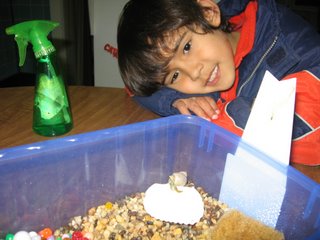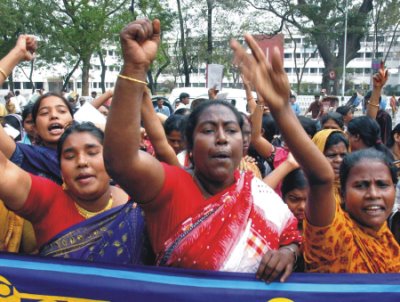Warning: Melodrama Ahead!
I went to a funeral today. My grandma's last sibling, Audrey, died early this week. I wasn't very close to Aunt Audrey, but I went to support my grandma, who is devastated to be the last surviving member of her family.
Funerals are always sad, but since Aunt Audrey was a Lutheran, I came out of the service wanting to kill myself. There was much talk of the crucifixion, original sin, and how "Christianity is the only religion that has a SAVIOR! All the other religions make you do it on your own!"
Of course, being the mental patient that I am, I thought about the inevitable loss of my grandparents, my parents, and possibly my husband (who is a decade older than I am, and has a family history of early bucket-kicking). The tears were dripping down my chin, and I started to think about how awful it would be to lose a child. I nearly had to get up and leave because I was beginning to sob.
Mortality is a fact of life, but I'm terrified to face it. My cyber-friend Zeenat sometimes blogs about the loss of her father. I can barely stand reading those posts. It breaks my heart.
Then I began to think about our grieving process. We spend lots of money on elaborate wooden boxes that will be used for a few hours and then buried in the ground. It seems very silly!! Most people believe in an afterlife, but our hearts break when our loved ones pass on into that supposedly glorious place. If we truly believe that it's a glorious place, why do we mourn? We mourn for the loss of our relationship with that person, the loss of the future they had, the loss of possibilities. This emotional irrationality is what makes us human.
And what about the people who are not mourned? According to this article (courtesy of Rezwan), up to 200 million women around the world are missing, and each year up to three million women lose their lives as a result of gender-based violence. Why don't we mourn these women? Why is it so difficult to find them?
Just ask my friend, Deb Anderson, who was walking through the local cemetery one day and saw a gravestone that said "Unidentified Woman". She learned that the woman was a murder victim. Deb has been working for years to find the identity of the woman. Many people wouldn't give it a second thought, but Deb believes that this woman deserves the dignity of a name on her gravestone, and so she continues the search.
Yes, our grieving process is strange, but even stranger is the fact that we give so much value to one human being while another can disappear without acknowledgement. What does it say about our world that there are hundreds of millions of women missing around the world? Don't these women deserve respect as human beings?
Mortality may be inevitable, but why does it disproportionately affect women? We need to fix this. Our future as (emotionally irrational) human beings depends on it. Until all humans are valued as humans, we will all continue to suffer.














